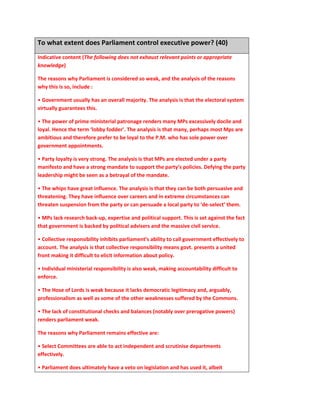
Jun 10 question, answer & report
- 1. To what extent does Parliament control executive power? (40) Indicative content (The following does not exhaust relevant points or appropriate knowledge) The reasons why Parliament is considered so weak, and the analysis of the reasons why this is so, include : • Government usually has an overall majority. The analysis is that the electoral system virtually guarantees this. • The power of prime ministerial patronage renders many MPs excessively docile and loyal. Hence the term ‘lobby fodder’. The analysis is that many, perhaps most Mps are ambitious and therefore prefer to be loyal to the P.M. who has sole power over government appointments. • Party loyalty is very strong. The analysis is that MPs are elected under a party manifesto and have a strong mandate to support the party’s policies. Defying the party leadership might be seen as a betrayal of the mandate. • The whips have great influence. The analysis is that they can be both persuasive and threatening. They have influence over careers and in extreme circumstances can threaten suspension from the party or can persuade a local party to ‘de-select’ them. • MPs lack research back-up, expertise and political support. This is set against the fact that government is backed by political advisers and the massive civil service. • Collective responsibility inhibits parliament’s ability to call government effectively to account. The analysis is that collective responsibility means govt. presents a united front making it difficult to elicit information about policy. • Individual ministerial responsibility is also weak, making accountability difficult to enforce. • The Hose of Lords is weak because it lacks democratic legitimacy and, arguably, professionalism as well as some of the other weaknesses suffered by the Commons. • The lack of constitutional checks and balances (notably over prerogative powers) renders parliament weak. The reasons why Parliament remains effective are: • Select Committees are able to act independent and scrutinise departments effectively. • Parliament does ultimately have a veto on legislation and has used it, albeit
- 2. sparingly. Examiners Report This was a popular question and, on the whole, a well balanced response was offered. The main problems included commonly omitting analysis of the House of Lords altogether or only a cursory mention, confusions about the kinds and roles of parliamentary committee and a tendency to overestimate the significance of prime ministerial power. Strong answers tended to have a good grasp of the role of select committees especially and understood the significance of parliament’s reserve powers. There were also some good evaluations of the powers and influence of the House of Lords, but very few were able to show how the influence of the Lords has grown, especially after 1997. There was general understanding that the size of the government’s majority was an important and variable factor and that patronage plays a key role in executive dominance. Having said that, there was a lack of sensitivity to the generally more activist approach of the House of Commons, especially after 2005. In longer questions, there is a greater requirement for a good deal of factual evidence and information about recent historical developments. The lack of response to this requirement proved to be the key factor in most responses. Plenty of answers could give generalised, but not very detailed analyses of parliament’s effectiveness. Examples of detailed analysis commonly omitted were the extent to which MPs are able effectively to represent the interest of constituents, or peers are able to represent outside interest, especially when scrutinising legislation. Some candidates decided to speculate that a hung parliament will be more effective than what has gone before. As we have said above, this remains only speculation and there is no hard evidence as yet as to whether this will be true. Such speculation, therefore, received very limited credit, but was rewarded marginally if the argument was coherent and based on solid foundations. (However, in 2013, you can discuss the coalition) Candidates who ignored the House of Lords altogether, and there was a signifi cant minority who did, could not achieve a mark above level 2. Candidates should be reminded that questions which refer to parliament require consideration of both houses, especially now that the Lords has become more significant in terms of legislative control.